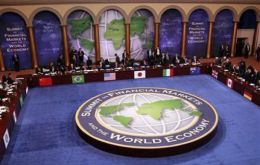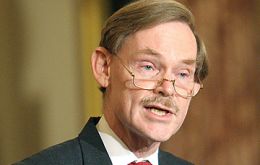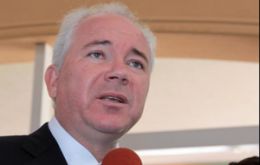MercoPress. South Atlantic News Agency
Tag: World Bank
-
Friday, September 23rd 2011 - 07:27 UTC
US and EU markets negative sentiment extends to Asian stocks with record losses

Asian stocks have fallen on Friday, with some indexes driving towards their worst weekly losses since 2008. The Group of 20 nations said they were ready to preserve stability in the financial markets.
-
Thursday, September 22nd 2011 - 07:42 UTC
Latin America and the Caribbean’s Long-Term Growth: Made in China?

Robust growth over the past decade in Latin America and the Caribbean (LAC) has had one new, key driver: China. The region’s relationship with the Asian giant has proved to be a critical source of stability, both during the global economic crisis of two years ago, the greatest since the Great Depression, and even the current market turmoil that is rolling across Europe and the United States.
-
Monday, September 19th 2011 - 21:20 UTC
EU and US debt crises contagion threatens developing world investor confidence

The head of the World Bank on Monday said a drop in investor confidence was already feeding through to developing nations from a growing debt crisis in advanced economies and urged “cooperative action.”
-
Thursday, September 15th 2011 - 07:13 UTC
“Time for muddling through is over” Zoellick tells the US, EU and Japan

The head of the World Bank said Wednesday the world had entered a new economic danger zone and that Europe, Japan and the United States all need to make hard decisions to avoid dragging down the global economy.
-
Monday, September 5th 2011 - 01:18 UTC
The big questions China still has to answer according to World Bank chief Zoellick

The world’s economic leaders need to “rebalance” their thinking as well as their economies. Fiscal and monetary policies have dominated. That makes sense to a degree: decisions on deficits, debt and the Euro zone this autumn may well determine whether the global economy slides deeper into danger, or begins the long climb back.
-
Wednesday, August 17th 2011 - 07:28 UTC
World Bank calls on governments to work on long-term debt curbs

The World Bank has called for national governments to seek long-term debt curbs to solve the current sovereign debt crises in Europe and the United States, but said it was too early for special action by the Group of 20 nations.
-
Tuesday, August 16th 2011 - 05:52 UTC
World Bank warns a ‘hard landing’ in China would have great impact in Latam

The World Bank's chief economist for Latin America and the Caribbean said Monday that the bank is maintaining its 2011 outlook for the region's economic growth at about 4.5% despite concerns of a new global crisis.
-
Tuesday, August 16th 2011 - 02:44 UTC
Global food prices in July 33% higher than a year ago, says World Bank

Global food prices are at high levels and when combined with continued volatility, put the poorest people in the developing world at continued risk, according to the World Bank Group’s Food Prices Watch released Monday.
-
Monday, August 15th 2011 - 01:08 UTC
Loss of confidence in economic leadership leaves world economy in “new danger zone”

The loss of market confidence in economic leadership in key countries like the United States and Europe coupled with a fragile economic recovery have pushed markets into a new danger zone, something that policymakers have to take seriously, the head of the World Bank said on Sunday.
-
Thursday, July 28th 2011 - 11:32 UTC
Venezuela remains committed to compensate oil companies, says minister

Venezuela said it remains committed to compensating Exxon-Mobil and Conoco-Phillips for nationalized oil assets, as long as the amount is reasonable and either settle by mutual agreement or set by the World Bank’s arbitration panel.
